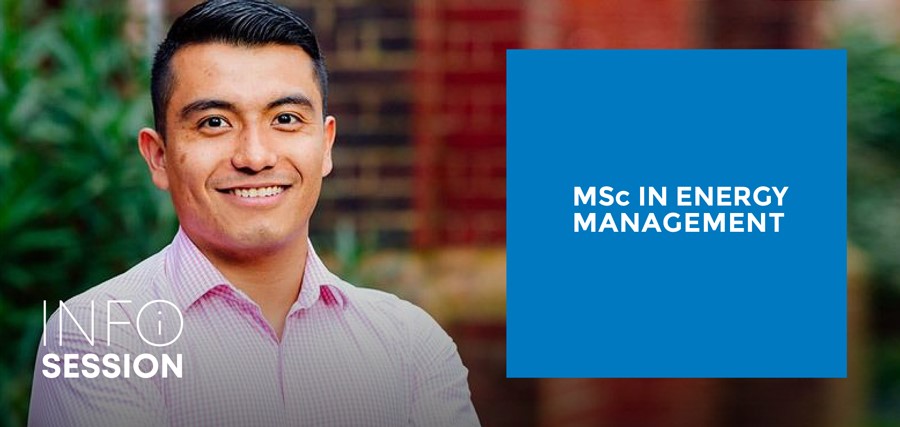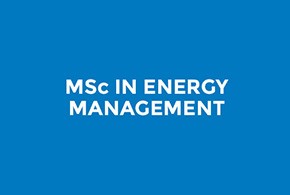| |
| |
|
Editorial
May we take this opportunity to wish you a prosperous 2022!
Our upcoming activities and latest research can be found below:
Online Events:
1.Invited talk on "The Role of the OECD in the Energy Transition" taking place on 8th February with Dr. Rodolfo Lacy, Director of the Environment Directorate of the Organisation for Economic Co-operation and Development (OECD). More info can be found below.
2. Info Session: If you are interested in joining our postgraduate MSc in Energy Management (MEM), we would like to invite you to join our webinar on 16th February. To register, click here.
Research:
We would like to thank our MSc in Energy Management Students Philip Mawusi Adiamah, Lucas Tesconi and Basundhara Dutta for their contribution in this section.
1. The Energy Consumption of Blockchain Technology by Philip Mawusi Adiamah. Find out more here.
2. Biogas and Agriculture: What We Can Learn from Western Europe's Errors by Lucas Tesconi. More info is available here.
3. The Chicken or the Egg? In order to reach net zero emissions, do we alter the electricity infrastructure to increase electric vehicle market penetration or promote the adoption of electric vehicles? By Basundhara Dutta. Read more here.
Energy Programmes at ESCP:
Admission process for the 2022 intake of our MSc in Energy Management (MEM) is open. To find out more about the specialisation, please click here.
Our new Executive Master in Future Energy is accepting applications for the February 2022 intake. For more information on the programme, please click here.
Finally, to keep up-to-date on all activities at the Centre, we invite you to join our LinkedIn group, Energy Management @ ESCP and follow us on Facebook.
|
| |
|
| |
|
Online Events
|

|
EMC Invited Talk Series
The Role of the OECD in the Energy Transition
The ESCP Energy Society and the Energy Management Centre were honoured to host a discussion on “The Role of the Organisation for Economic Co-operation and Development (OECD) in the Energy Transition” with distinguished speaker Dr. Rodolfo Lacy, Director of the Environment Directorate of the OECD.
|

|
|
|
|
Latest News
|
Thursday, January 20, 2022
On 10th March, students from the MSc in Energy Management specialisation will visit Verwood Solar Farm. It is owned by Belton Power, a well-established clean-energy company at the leading edge of renewables project development in the UK.
Located 3 km from Verwood in Dorset, the farm was built in 2014 ...
|
|
|
|
Our Mission
|

|
|
The EMC Advisory Board
|

The EMC Advisory Board is comprised of top energy experts from the world's industry leaders in both the public and private sectors.
- The curriculum of the MSc in Energy Management, ensuring the specialisation meets the needs of participants on academic and professional levels.
- Research that makes significant impact on best business practices.
- Current and future activities which benefit the EMC's partners, affiliates, students and alumni.
|
|
Energy Programmes
|

London - Paris - Internship
|
|

|
|
|
|
Research
|
EMC Working Papers
The potential for blockchain technology to profoundly disrupt the world as we know it is enormous. The financial system is often seen as the most vulnerable industry primed for disruption. This technology has the potential to disrupt a variety of industries, including aerospace and defence, supply chain and logistics, and energy management, most notably decentralised micro-grid systems.
Background
- Examine the common misconceptions about the environmental impact of Blockchain mining
- Analyse the options for transitioning blockchain mining away from fossil fuels and towards variable renewable energy sources (vRES)
EMC Working Papers
Within the debate around climate change, renewable energy sources (RES) hold an important place, some of which are perhaps more widely known than others. Next to solar and wind, biomethane is less well known and often even classified in “other renewable power”. However, it has a bright future as solar and wind showed their limitations in Autumn 2021, being partially responsible for the increase of gas prices in Europe.
More than ever, our growing dependence on intermittent energy sources makes it crucial to diversify the energy mix. It should be noted that, even though Europe is moving towards a system that heavily relies on electricity as an energy carrier, many industries such as iron or cement making are not yet ready to be powered by electricity, and hence rely heavily on fossil fuels.
Unlike other RES, biomethane shares almost all its characteristics with natural gas, making it interchangeable and suitable for industry applications, whilst using the existing gas transmission network.
As part of the quest to diversify its energy mix and increase its energy independence, the European Union is encouraging the development of methanation. Germany was the first country to get on board, and France is now joining its neighbour on this path. However, the urgent need for decarbonisation framed by the Paris Agreement seems to push all stakeholders into acting too quickly, leaving space for abusive practices and for things to get out of hand, to the detriment of sustainable agriculture practices.
|
|
EMC Working Papers
In order to reach net zero emissions, do we alter the electricity infrastructure to increase electric vehicle market penetration or promote the adoption of electric vehicles?
The Paris Agreement at COP21 highlighted that, despite the reductions in carbon emissions recorded in other sectors, in the transport sector they have steadily increased, trending toward a 50% increase by 2030. Globally, the transport sector is still heavily dependent on fossil fuels, accounting for around 17% of the world’s emissions. Thus, the topic of electric vehicles (EVs) has been the focal point of discussions in decarbonising the sector. However, there have been many critiques of the plausibility of transitioning to EVs and whether we should, (1) change the electricity generation grid, or (2) facilitate the transition to EVs by dismissing the emissions of the unchanged electricity generation mix. Will the transition be of environmental benefit? And what comes first: introducing large-scale EV adoption to facilitate decarbonisation through fiscal policies, or changing the infrastructure to stimulate the adoption of electric vehicles?
EMC Working Papers
- Croatia should commission a Small Modular Reactor (SMR) as a pioneer of new types of nuclear power station
This short policy report considers the opportunities available to the Croatian government for the utilisation of new nuclear technology for domestically produced energy.
As other European countries struggle to balance their desire for a reliable energy supply with their contribution to climate change, recent advances in nuclear technologies present a solution.
|
Anthony Evans , Lordia Yalley, Faith Ogedengbe
|
READ MORE
|
|
|
|
| |
|




















